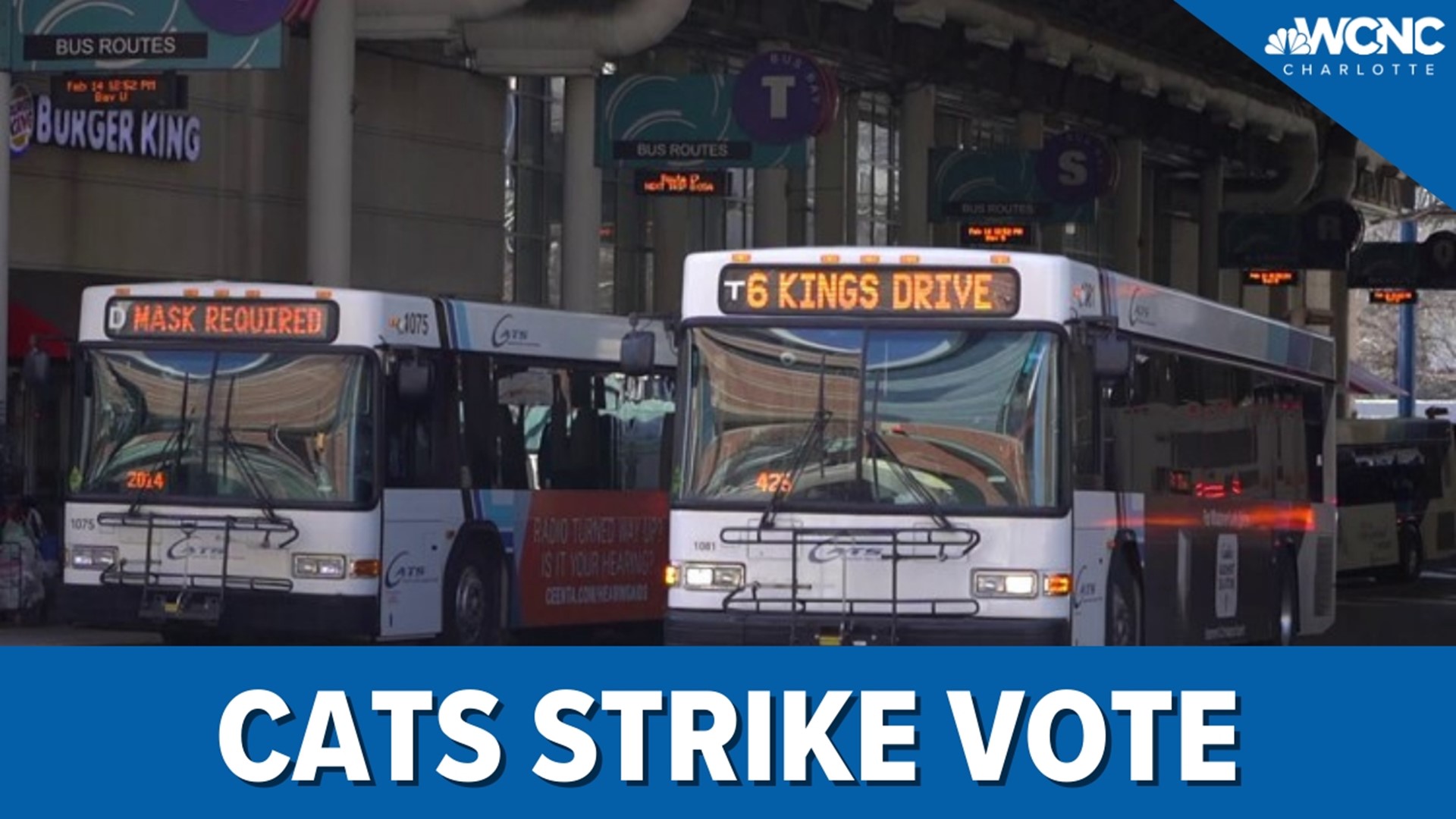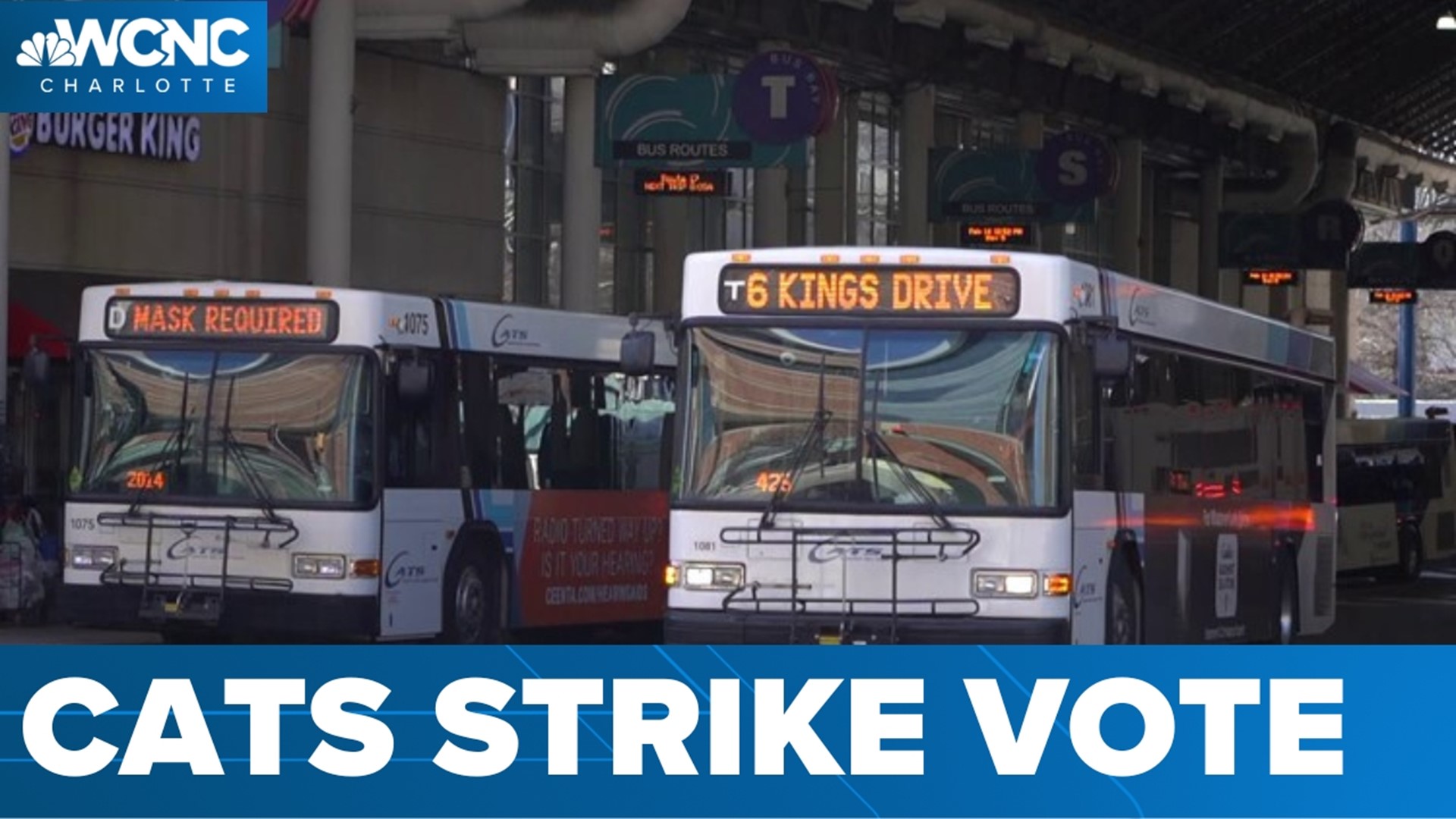CHARLOTTE, N.C. — After months of failed contract negotiations, Charlotte Area Transit System bus operators are weighing out their options. Sources told WCNC Charlotte’s Jesse Pierre that two contracts were rejected by operators who are represented by the SMART union.
Late Saturday night, a source told Pierre that union members voted 254-14 in favor of striking. This does not mean members are striking immediately, however -- but it does mean a strike could happen in the future should union members decide to do so.
"Once the workers are organized, management is legally obligated to negotiate with that group of workers over their wages and benefits and other conditions of employment," Steven Allen, Professor of Economics at NC State University, said. "And now, keep in mind, it's the bargaining unit itself, that negotiates with management."
CATS said negotiations are ongoing between the SMART union and RATP Dev, the company that manages the bus operators.
Due to state law, neither the city of Charlotte nor the agency itself has a say in these agreements. However, councilwoman Dimple Ajmera said finding an agreement is beneficial to all.
“We cannot get into bargaining agreements with the union," Ajmera said. "So that's where there is an agency RATP Dev that works with the union. And they hire operators, and they are the ones who are responsible for ongoing concerns with the operators."
Allen said a strike is not uncommon when parties cannot agree on the final terms of a labor contract.
“You're sending to management a signal that you're very, very serious about working conditions and compensation at the workplace,” Allen said.
Allen said voting to authorize a strike keeps things in order, lawful, and part of normal procedures.
"If the union were to go out on strike, without going through the process, it would be called a wildcat strike -- the management could get an injunction forcing them to go back to work,” Allen said. “So, it would be a big mistake on the part of the union, to just say, 'Hey, we're out of here.'"
Debra Franklin, now a retired bus driver worked for CATS for 14 years and is a former union officer. She said in her entire career there’s never been a strike authorization vote.
"We have come so close, but most of the time we give in. And so this is the first time that they are fighting back," said Franklin.
She adds it's important for all of the workers to make their voice count.
"Operators should be happy to come to their place of employment but instead, we have operators leaving," Franklin said. "So this contract is crucial. What happens with this contract will decide whether people go or stay."
CATS provides 6.5 million rides a year on buses and rail systems. Those who ride the bus could be impacted if CATS transit workers choose to go on strike.
"This system doesn't run without the bus operator were the most important," said Franklin. "Sometimes the priorities are wrong, we should be focusing on what the bus operator needs."
“Public transportation, it's critical," Ajmera said. "It's a core service that every resident should have access to a reliable public transportation system."
She added CATS has a contingency plan for reduced workforce impacts, and a strike would significantly impact bus services. However, CATS rail and paratransit operations are not affected by these negotiations, as they are operated by city employees.
“That's why it's so important that there is a mutually beneficial agreement that our RATP Dev and the union work out because this will help us serve our residents,” Ajmera continued.
Bus drivers say they are concerned about pay, safety, health insurance, job security, and changes to the point system for unexcused absences. Some were also concerned about a sympathy strike clause added to the contract.
Bus operators' current starting pay is $18.77 per hour.
"Anybody who does a job deserves to be paid fairly for that period… and that is especially for bus drivers. People don’t consider the extra risk they take driving on these streets at night," said Anna Boykin, a bus rider.
The strike vote authorization is a concern for riders dependent on public transportation.
"I def require this to get to work, get to the grocery store, any appointments I have I use the bus," said Boykin.
If a strike is approved, Allen said negotiations continue.
“In this case, you know, the union really has an upper hand in the negotiation because they can't easily find replacements for a job that requires no small amount of training," he said. " And a certain temperament, I would add."
The agency said it is important to note, if the strike is successful Saturday, it does not mean it would start immediately but that the union could go on strike in the future.
WCNC Charlotte has reached out to both CATS and RATP Dev for a response to the vote Saturday night. We will update this story should we receive comment.
Contact Jesse Pierre at jpierrepet@wcnc.com or follow her on Facebook, Twitter and Instagram.


